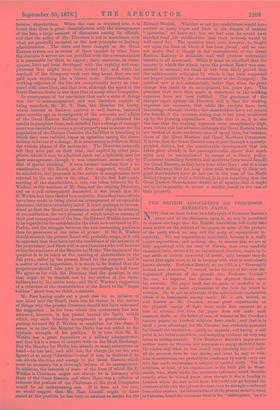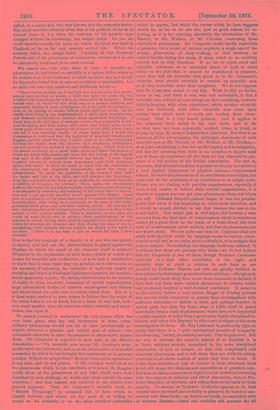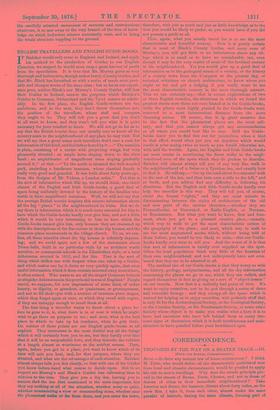THE BRITISH ASSOCIATION ON PROFESSOR BARRETT'S PAPER.
NOW that we have before us a full report of Professor Barrett'e paper and of the discussion upon it, we may be permitted to express our hope that the British Association will really fake some action on the subject of the paper, in spite of the protests of the party which we may call the party of superstitious in- credulity. We say superstitious incredulity, because it is really a pure superstition, and nothing else, to assume that we are so fully acquainted with the laws of Nature, that even carefully examined facts, attested by an experienced observer, ought to be cast aside as utterly unworthy of credit, only because they do not at first sight seem to be in keeping with what is most clearly known already. Professor Barrett, we are told, is a " thoroughly trained man of science," "trained under the eye of the most dis- tinguished physicist of the present day, Professor Tyndall." No one, we suppose, has thrown the slightest doubt upon his veracity. His paper itself has no grain of credulity in it. He catches at no hasty explanation of the facts for which he vouches. He is not an advocate of the spiritualistic explanation which is so fashionable among many. He is not, indeed, so well known as Mr. Crookes, whose great experiments on the physical energy of light have made him eminent as a man of science, but then his paper does not make such immense drafts on the belief of men of science as Mr. Crookes's various papers on kindred subjects have made ; and that is in itself a great advantage, for Mr. Crookes has evidently procured for himself the reputation,—justly or unjustly,—of having a soft point in his brain somewhere, and accepting evidence on very easy terms in testing marvels. Now Professor Banrett's paper shows neither haute to theorise nor eagerness to accept doubtful facts. He relates only what he has tested very carefully himself under all the severest tests he can devise, and what he says in rela- tion to mesmerism can probably be confirmed by nearly every one who has made mesmerism a subject of careful study. The de- scription, at least, of his experiments on the little girl in West- meath, who, when under his mesmeric influence, could describe exactly what he himself knew, even though it was a locality in London where she had never been, but could not go beyond the contents of his own thought at the time, may be strongly confirmed from other sources. An intimate friend of the present writer's, when in Calcutta, found the very same limit to the" clairvoyance," as it is
called, of a native girl, who was thrown into the mesmeric trance. She oould describe minutely what was in his pockets, so far as he himself knew it, but when the contents of his pockets were changed without his knowledge, her insight failed. So, too, she could describe exactly the place on which his mind was fixed in 'England, so far as his own memory served him. Where his memory failed, her insight failed. Certainly all that Professor Barrett said of the phenomena of mesmerism, curious as it is, can be adequately confirmed from other sources.
We cannot see, then, why, when he came to describe the phenomena he had tested so carefully in a sphere which seems to be outside that of the influence of mind on mind, any one should be disposed to brand him at once as credulous or unscientific. Let us quote his own very cautious and deliberate words :—
"About twelve months ago I was told that the daughter of a gentle- man of good position in society, a child not quite ten years old, was troubled with knockings, for which no cause eould be assigned. These sounds came on whenever the child was in a passive condition, and apparently displayed some intelligence, as they would keep time to a tune or, by rapping at certain letters, would spell out words. As the family were living in my neighbourhood, I made their acquaintance, and obtained permission to examine these mysterious knockings. I found that, in the full glare of sunlight—when every precaution to pre- vent deception had been taken—still these raps would occur, in dif- ferent parts of the room, entirely out of reach of the child, whose hands and feet I was watching closely. A dozen times have I tested the phenomena in every way that the ingenuity of sceptical friends could suggest, and the result was that I could come to no other conclusion but that the sounds were real objective raps, displaying intelligence, and yet certainly not produced by any visible cause. I have often had the sounds occurring on a small table, above and below the surface of which my hands were placed, and have felt the jarring of the tape on that part of the table enclosed between my hands. I have taken sceptical friends to witness these phenomena. and their testimony agrees with mine. It must be borne in mind that the conditions of the experiment are singularly unfavourable either for fraud or hallucination. To avoid the possibility of the former, I have held the hands and feet of the child, and still obtained the knockings; they have occurred on the lawn, on an umbrella, far removed from the possibility of deception by servants. Then, again, the impressions made on the senses by the bright sunlight, conversation, and movement, were perpetually correcting any tendency to fall into a state of reverie, even had I not specially guarded myself against this danger. I can give no explanation of the occurrence, but it is a curious fact that these manifestations, after rising to a maximum, in the case of this child, gradually faded away, and now have entirely ceased. All that can be said concerning the child is that her health is stronger now than when subject to this curious malady. Were it imposture on her part, she would be more likely now to produce these manifestations as the interest of friends having been excited, temptations to deceit desire, for notoriety are stronger now than during the time of my in- vestigation, when scarcely any one outside her family circle knew of the feats. I think it is ray duty to put on record the facts I have narrated."
Now is that the language of a fanatic, or of one who was greedy of marvel, and had not the discrimination to guard against the illusions to which the mind of the observer itself is subject? Whatever be the explanation of such facts,—which of course is a matter for scientific men to discover,—it is at least a satisfaction to know that in some cases they are genuine, as it relieves one of the necessity of assuming the existence of such vast masses of credulity and fraud as Professor Lankester's position, for instance, would apparently require. No doubt, whatever may be the nucleus of reality in these eccentric capacities of special organisations, large adventitious bodies of hysteric extravagance and illusion and direct fraud are quite sure to collect round them. But it is at least some comfort to have reason to believe that the origin of the whole belief is not in fraud, but in a basis of real fact, how- ever muoh smaller than the structure which credulity and super- stition raise upon it.
We cannot pretend to understand the only reason which has ever been given why the real occurrence of these extra- ordinary phenomena should not be at least provisionally ac- cepted, whenever a genuine and careful man of science, who commands attention in other departments of observation, attests them. Dr. Carpenter is reported to have said, in the British Association :—" We scientific men accept Mr. Crookes's state- ments upon the radiometer, and upon the whole series of beautiful researches by which he has brought that instrument to its present position. Why do we accept them? Because these can be reproduced at any time, and by any person. If Mr. Crookes would show us the phenomena which he has described, or if you or Dr. Huggins would show us the phenomena at any time which have been described in your writings, we would give them exactly the same attention ;" and that remark was received in the section with general applause. Now Dr. Carpenter's valuable book on "Mental Physiology" is crammed full of facts which he himself believes, and which we are most of us willing to accept on his authority or on the other excellent authorities
which he quotes, but which the excuse which he here suggests would be, as far as we can see, just as good reason for re- jecting, as it is for rejecting absolutely the attestations of Mr. Barrett, or Mr. Wallace, or Mr. Crookes, concerning these marvellous phenomena. Dr. Carpenter could hardly reproduce at pleasure, for a crowd of curious inquirers, a single one of the strange phenomena of sleep-walking, or dual memory, or exalted faculty during the hours of sleep, which he so carefully records and so ably discusses. If we are to reject good and scientific testimony as to abnormal states of body or mind solely on the plea that it cannot be reproduced at pleasure, more than half the scientific data given us in Dr. Carpenter's valuable book should certainly be treated by scientific men as if they were little more than imaginary. We do not suppose that Dr. Carpenter meant to say this. What he did, no doubt, mean to say, and what is very wise and undeniable, is that a scientific man will not at once accept as fact everything, however little in keeping with other experience, which another scientific man has observed, until other scientific men come upon similar facts which tend to verify and confirm these obser- vations. That is a very sound position. And it applies to the abnormal facts stated in his own work, just so far as they have not been repeatedly verified, either in detail, or at least in type, by several independent observers. But that is no reason at all for not accepting the deliberate statements of such scientific men as Mr. Barrett, or Mr. Wallare, or Mr. Crookes,- as at least establishing a case for careful inquiry and investigation, still less for asserting that there is no occasion to inquire until one of them can reproduce all the facts he has observed in pre- sence of a full section of the British Association. The fact is, of course, that this last condition is possible at all only in relation to a very limited department of physical science,—experimental science. Even for the phenomena of an occultation or an eclipse, you must wait till the conditions of an occultation or an eclipse recur. Where you are dealing with peculiar organisations, especially if there is any reason to believe them morbid organisations, it is absurd to suppose you can get your phenomena when and where you wilL Professor Barrett's patient began to lose her peculiar power just when it was beginning to excite most attention, and it would be simply childish to say that because this was so she never had it. You might just as well argue that because a man recovers from the dual state of consciousness which is sometimes caused by a great blow on the brain, or a brain-fever, this dual state of consciousness never existed, and that its phenomena are not worth study. We are quite sure that Dr. Carpenter does not really hold the view which his language seems to convey, other- wise he would not be so ready, as he evidently is, to investigate this curious subject. Nevertheless, the language itself may mislead. It is evident that there are persons who think—we do not believe that Dr. Carpenter is one of them, though Professor Lankester evidently is — that utter incredulity is the right and scientific state of mind in relation to such facts as are detailed by Professor Barrett, and who are greatly fortified in that opinion by detecting a gross fraud now and then,—though such frauds would most likely have never been conceived or devised, if there had not been some curious phenomena to imitate, which had previously inspired a well-founded confidence. It seems to us that science incurs a very serious danger of forcing persons who are not really competent to pursue these investigations with sufficient strictness, to dabble in them, and perhaps founder in waters quite too deep for them, when it holds aloof in grand incredulity from a class ef phenomena which have now conquered a certain amount of belief from a good many highly disciplined in- tellects, and when it is disposed to affix a sort of stigma to the mere investigation of them. Mr. Ray Lankester is profoundly right in saying that there is a "quite unsuspected amount of incapacity for observing" atom% us ordinary mortals. That is quite true. But the way to increase the amount, instead of to diminish it, is to leave ordinary mortals, unassisted by the more disciplined observation of men of science, to deal with complicated and abnormal phenomena, and to tell them they are fools for asking questions at all about matters of which they hear so much. It is the close attention of men of science to these abnormal facts which will despel the illusions and superstitions of practical men. But men of science cannot even begin to teach us without receiving with due respect all cautious and sifted statements, such as Pro- fessor Barrett's, of the facts, and taking these as the basis for their inquiry. To assume, as Professor Lankester appears to do, that because there are fraud and credulity in plenty to be found in con- nection with these facts,—as thereis, no doubt, in connection with all nervous diseases,—fraud and credulity will account for all the carefully attested statements of accurate and conscientious observers, is to saw away at the very branch of the tree of know- ledge on which Inductive science necessarily rests, and to bring the whole structure toppling to the ground.




































 Previous page
Previous page